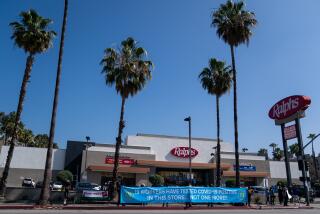Northrop Has Settled Alien Hiring Case : Firm Caught Between Conflicting U.S. Rules
- Share via
WASHINGTON — The Justice Department said Tuesday that it had settled a discrimination case with Northrop Corp. after the company agreed to allow all persons--including those who are not citizens and do not have green cards--to work in unclassified areas at the company.
The company had been accused under the 1986 Immigration Reform Act of requiring its contractors to hire only U.S. citizens or aliens with green cards, which are work permits for non-citizens. The law says employers must not discriminate against aliens who are seeking U.S. citizenship, even if they do not have green cards.
The Justice Department said Northrop was the first target of government prosecution in the defense industry to break a pattern of “citizenship status” discrimination.
Northrop and other defense contractors said they had feared that they might violate State Department and Commerce Department security regulations by allowing non-citizens into factories and offices where sensitive technical information was available.
In effect, Northrop and the other firms were trapped in a conflict between competing government regulations. The security rules are aimed at preventing the leak of secret information to other countries by keeping the sensitive files closed to foreigners.
Companies followed those rules by telling their subcontractors, those who supplied anyone from engineers to janitors, to hire only citizens or foreigners who had green cards.
On the other hand, the 1986 Immigration Reform Act makes it a crime to discriminate in hiring on the basis of citizenship. Citizens and “intending citizens”--anyone seeking to become an American--have the same rights. Intending citizens may be permanent residents, refugees, those seeking asylum or temporary residents admitted under the new law.
More to Read
Inside the business of entertainment
The Wide Shot brings you news, analysis and insights on everything from streaming wars to production — and what it all means for the future.
You may occasionally receive promotional content from the Los Angeles Times.










